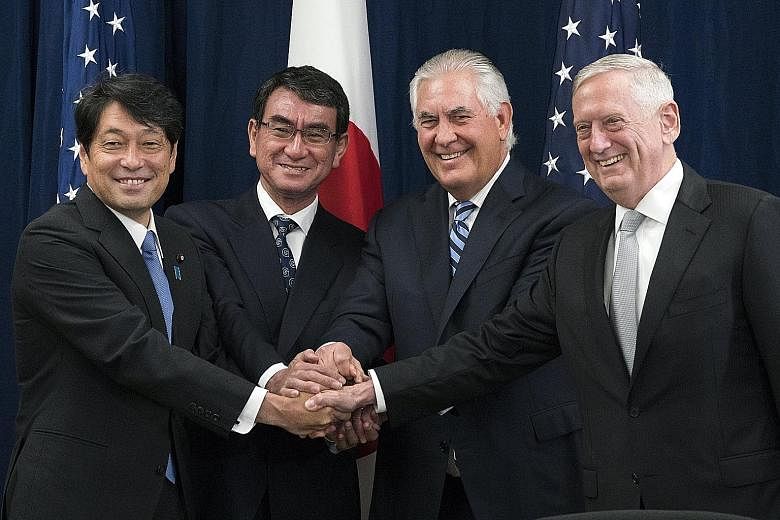North Korea will face "strong military consequences" if it were to initiate a missile strike on the United States or its allies, US Defence Secretary James Mattis has said.
His Japanese counterpart Itsunori Onodera also stressed his nation's need to "enhance its defence capability and posture", given the North's progress in its ballistic missile and nuclear weapons programme.
They were speaking at a joint news conference alongside US Secretary of State Rex Tillerson and Japanese Foreign Minister Taro Kono in Washington on Thursday (yesterday, Singapore time).
The North dominated the agenda as the leaders met for more than three hours for the high-level "two-plus-two talks", in the first such session since April 2015.
"In close collaboration with our allies, there are strong military consequences if DPRK initiates hostilities," Mr Mattis said, using the initials of the North's official name, the Democratic People's Republic of Korea. Mr Tillerson added: "Our approach has been endorsed by the President."
The US media has portrayed their remarks as a rebuttal to the freewheeling comments by White House chief strategist Stephen Bannon, who said in an interview this week that tensions with the North were "just a sideshow" to which there was "no military solution".
In a joint statement, the US and Japan "condemned in the strongest terms" the North's bellicose actions and noted an ever-growing threat has entered a new phase.
-
500km Maximum altitude at which the Aegis Ashore system can destroy targets outside the earth's atmosphere. There is a possibility that Japan may acquire it.
34 Number of PAC-3 missile interceptor units which Japan has. It can destroy targets at altitudes of between 10km and 20km.
Separately, Mr Mattis also reaffirmed the US' ironclad commitment to South Korea in a phone call with newly appointed Defence Minister Song Young Moo yesterday.
Last week, Pyongyang threatened to lob a volley of four missiles into waters around the US territory of Guam, after US President Donald Trump said he would unleash "fire and fury like the world has never seen" on the North, which successfully launched two intercontinental ballistic missiles last month.
Japan yesterday held a drill for its emergency alert system in nine prefectures in the western part of the country, over which the missiles are likely to fly en route to Guam.
The joint statement said: "Japan intends to expand its role in the alliance and augment its defence capabilities, with an eye on the next planning period for its mid-term defence programme. The US remains committed to deploying its most advanced capabilities to Japan."
These new or expanded areas will include defence equipment and technology cooperation, as well as intelligence, surveillance and reconnaissance. Further, Mr Onodera mooted the possibility of Japan acquiring the Aegis Ashore system as an added layer of protection against the North Korean threat.
This is the land-based version of the Standard Missile-3 (SM-3) advanced radar units mounted on Aegis warships which can destroy targets outside the earth's atmosphere up to an altitude of 500km.
Japan also has 34 Patriot Advanced Capability-3 (PAC-3) missile interceptor units which can destroy targets at altitudes of between 10km and 20km.
Japan and the US both stressed the use of economic and diplomatic pressure to bring North Korea back to talks, while urging China to do its part.
Mr Tillerson said military action is "not our preferred pathway", and pressure will have to be raised such that the North is so isolated it realises its future "is bleak and will only become bleaker". This is to make it give up its weapons programme and return to talks.
But Pyongyang's deputy ambassador to the United Nations Kim In Ryong has said the country's "self-defensive" nuclear weapons programme will never be up for negotiation, as long as Washington's "hostile policy and nuclear threat continue".

